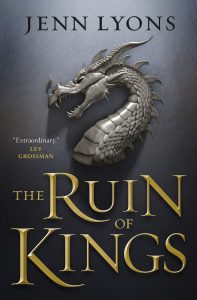 This was a strange experience.
This was a strange experience.
First, the fact that I got into a new fantasy series on release day of book one. Who does that?? Nobody, is who. But I have a friend whose business is book stuff (recapping mostly), and I read the first quarter or so of the book online via her recaps, and it was enough to make me want the book after all. So, I am a fool and here we are.
Second, the way I read it. Which was very slowly, for no compelling reason. The last handful of chapters, in which everything is rushing towards climax and upturning everything you thought you knew? That should have been a voracious two hours instead of the two weeks it was in fact. When I say I’m just not good at reading anymore, I think what I mean is that my job is draining too much out of me, and that it actually has nothing to do with reading. At least I’m still soldiering on, instead of becoming, at this late date, a wildly different person than I have ever before been. Slow is good enough, I guess?
That was a lot of words that were largely not about The Ruin of Kings, so I guess I need to shift gears.
The first thing to understand… no, I already covered that. Book one of a projected five book series, and it was released a couple of months ago, maybe? So, you are warned. The first non-warning thing to understand is that this is quite a bit more intricate than the average. Part one is told in a series of disjointed parallel flashbacks, and it lasts for 90 percent of the book. Then, part two goes completely off the rails, which I am going to deem not a spoiler because if an epic fantasy doesn’t go off the rails in the last few chapters of the first book, that is what would be a spoiler to mention. I mean, really now.
The second thing to understand is that the reliability of the narration is highly questionable. I already know that the book benefits from a reread to go back and untangle truth from falsehood from error, and I’m willing to bet that this will be true again after subsequent books in the series. Maybe not, as it’s… well, I’m not sure what stand-alone even means in this context. There is obviously more story to tell, and it is equally obvious that the central conundrum of the series has barely been scratched, and at best mostly revealed instead of just partially. (Or in error. As you can see. I’m not sure yet.) But at the same time, it comes to a satisfactory conclusion after a satisfactory arc, both for the principle characters and for the principle events. So I was going to say that it’s fairly stand-alone, and this could result in the final outcome being trustworthy and not to be rewritten in the future. But I honestly expect my perspective to shift more rather than less.
Anyway. It’s a good book, and it’s separately a well-constructed plot, about which I remain interested right now, and would probably read the next book immediately if I had it. It is not so good that I would willingly encourage anyone to read it knowing that it isn’t finished. (There are maybe two books that I would, and maybe only the one, so that’s not really a knock against this. It’s just mean to make someone read a story that might never end, or might outlive its author.)
If you do read it, though, Leigh’s reread is still going. So that’s cool.
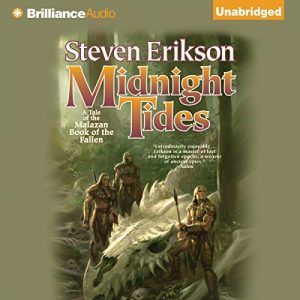 I feel like I have been listening to
I feel like I have been listening to  As foretold in prophecy[1], I have gone forth and seen
As foretold in prophecy[1], I have gone forth and seen  I’ve tried to stay away from reviews of
I’ve tried to stay away from reviews of 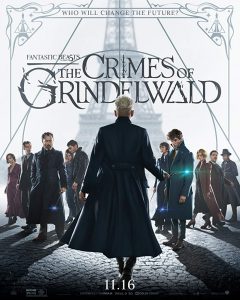 A thing to know about the Fantastic Beasts sequel is, it has no sympathy if you don’t particularly remember (or especially none if you didn’t see)
A thing to know about the Fantastic Beasts sequel is, it has no sympathy if you don’t particularly remember (or especially none if you didn’t see) 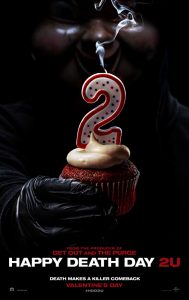 At the very beginning of
At the very beginning of 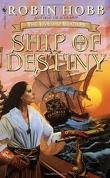 Considering how direly the trilogy
Considering how direly the trilogy 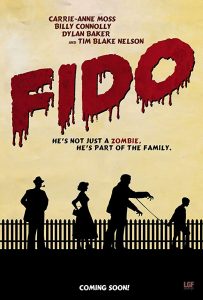 First things first: ugh, commercials. Like, I dislike them, sure, that’s fine, so does everyone. But there’s a qualitative difference between a show made with commercial breaks in mind, and a movie. Hell, even old school movies on network television, they had people with talent who selected break points as naturally as possible. Modern streaming services with commercials, though… man. It’s just so bad.
First things first: ugh, commercials. Like, I dislike them, sure, that’s fine, so does everyone. But there’s a qualitative difference between a show made with commercial breaks in mind, and a movie. Hell, even old school movies on network television, they had people with talent who selected break points as naturally as possible. Modern streaming services with commercials, though… man. It’s just so bad. Obviously, they can’t all be winners. But what hurts is when I can see the way to… okay, that’s an unfair claim.
Obviously, they can’t all be winners. But what hurts is when I can see the way to… okay, that’s an unfair claim.  You know those movies where people make one or two bad decisions, and things spiral irretrievably out of control?
You know those movies where people make one or two bad decisions, and things spiral irretrievably out of control?